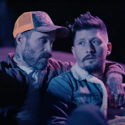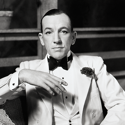
Scott Long, the director of Human Rights Watch’s queer program, and the guy who the organization just delivered a five-years-in-the-making apology for his untruthful and vicious defamation campaign against British activist Peter Tatchell, is leaving the organization, he relays in a goodbye email. He “suffered a pulmonary embolism of a fairly unpleasant sort,” which left him in intensive care and the time to make a lot of lists about life. “Somewhere in the middle of the lists, I realized that working for Human Rights Watch wasn’t on them.” So is this a health-related exit, or him forced out for being a jerk?
His full autobiographical exit interview:
As some of you know, in mid-July I suffered a pulmonary embolism of a fairly unpleasant sort. While running to catch a bus on a New York street, I saw a blinding effusion of white light, amid which several spangled and bell-bottomed figures vaguely resembling ABBA beckoned me to an eternal disco complete with spinning ball. Yanked back from their blandishments by a superior fashion sense, I spent a couple of weeks in intensive care. I had plenty of time lying in a bendable bed with an IV dripping, to compose, like Woody Allen, lists of the things that make life worth living: the last movement of Bruckner’s Third Symphony; “Sit Down, I Think I Love You” as covered by the Staccatos, with that harpsichord and those violins; the closing pages of “Lolita”; W. H. Auden as sung by Cleo Laine. Somewhere in the middle of the lists, I realized that working for Human Rights Watch wasn’t on them.
I am resigning as director of the lesbian, gay, bisexual, and transgender rights program at Human Rights Watch. I feel great pride at what this program has accomplished in the almost eight years I have worked at HRW. I’ve had the privilege of partnering with the best, smartest, most creative and committed staff in the world: Juliana Cano Nieto, Boris Dittrich, Rasha Moumneh, Dipika Nath, Jessica Ognian, and, in the past, Jessica Stern and Iwona Zielinska. I am also especially proud of the deep and cooperative relationships we have built with activists and social movements around the world. I remember our long engagement in Egypt, where with a coalition of courageous human rights groups we produced evidence and performed advocacy to terminate a state crackdown that had marred hundreds of lives. I remember our work in Jamaica, where we were present at the creation of a similar activist coalition that generated passionate debate about the island’s colonial sexual legislation for the first time—and provided vital legal and social support to people under attack or arrest. I remember our efforts in Iran, where our accurate research dispelled misconceptions and deceptions about the state of sexual rights, and where we furnished life-saving assistance both to activists inside the country and to asylees without. I remember our emergency work in Iraq, where we documented for the first time ever who was behind the killings of non-conforming men, and began the slow work of putting the issue on a paralyzed state’s and still-stunned society’s human rights agenda. And I remember our work in the United States, where we showed the intersections between homophobia and anti-immigrant agitation, and the invisible corrosions both insinuate into people’s struggles for common lives.
The LGBT Rights Program was, and to some extent remains, an experiment: the first program of its kind at a so-called “mainstream” human rights organization. Undeniably there have been frustrations. One of the most basic splits in contemporary human rights work—sometimes mapped onto a division between “global South” and “global North,” though not quite reducible to it—is between rights as a set of legal norms, and rights as a complex of human dreams and political aspirations. The split has to do, as well, with the difference between institutions and movements, the former ones formal and developing their own standards and needs, the latter fluid and chaotic and responsible to individuals’ and communities’ desires and drives. The LGBT Rights Program worked balanced on the knife’s edge between these divisions.
It was never easy. Things need to change. For its efforts in this sphere to succeed in future, Human Rights Watch—and other international organizations like it—needs a far deeper understanding of what social movements are, why they are important, how they turn human rights into living values rather than legal abstractions. It also needs a far clearer comprehension of the political contexts in which it works every day; the impotence of artificial categories to explain the experiences of suffering or joy; the intersections that are the real geography of LGBT people’s, and everybody’s, lives.
Racism, neocolonialism, Islamophobia, patriarchy, anti-Semitism, and sectarian hatred, to name only a few, are as real as homophobia for LGBT people. They are real facts within LGBT movements as well. A “mainstream” intervention that willfully elides this complexity is doomed to make almost everything worse.
Likewise, though, our movements need to compare their histories more closely and examine their actions more exactingly. They must reject the temptation to be parochial, simply because others are. They must be alert for the foreshadowings of real rather than simply rhetorical universals that glimmer through the challenges they have overcome. Every intersection is a meeting place, as well as a divergence. To forget that is to be crucified on the differences, and divided into irrelevance.
And that’s it. One of the glorious Nina Simone’s recordings—it’s her version of “I Shall Be Released”– starts off with her stopping the band: “Don’t push it,” she tells them. “Don’t put nothin’ into it unless you feel it.” That’s my mantra as I move ahead. I intend to rest a bit, most likely with a fellowship at Harvard University over the next year, and write a book: based on my own experience, about what’s moral and what’s immoral about “international solidarity,” and what’s worked and what hasn’t in campaigns for sexual rights. I’ll keep on being a loud voice for the things I do value—“Lolita,” liberation, and more; and with the book behind me, I’ll be back to activism. In much the same form, probably, only different. I can be reached at:
Scott Long
E-mail: [email protected]
Telephone: +1 646 XXX


















PLAYS WELL WITH OTHERS
Sounds like he got a bad hit of somethin’…… :p
GregorVonK
Sounds like there’s more to the story than what’s presented here. Queerty seems to prefer clear villains and heroes. I’m not sure that’s always possible, but it makes for good copy. (The link didn’t really explain that much either. Questions remain: did Scott Long set out to deliberately malign (and ultimately bring down) another activist, knowing full well that the man was innocent of the charges? Was there room for differing interpretations of Tatchell’s stated positions? Was “oneupmanship” a problem here (“more radical than thou”)? I’m sure there are others like me who need more context.
fagburn
Shame on Queerty for their angle on this.
Queerty, do you think there’s been a defamation campaign against Scott Long?
If not, why is he such a bogey man for people who haven’t bothered to look into the facts of the case?
Did you actually read the apology?
I hope people bother to read his letter.
I hope people read his book.
Richard Kirker
There is no missing context, defamation, or hidden facts in this story. Queerty have got it right.
Scott Long’s repeated factual inaccuracies and gratuitous personal abuse towards a distinguished fellow human rights activist were first drawn to the attention of HRW privately five years ago. Private entreaties had no effect in bringing this pernicious individual to heel. Making the case against him public, eventually, was what made HRW belatedly take action.
Scott Long stubbornly declined to acknowledge the falsehoods or retract the abuse. What more evidence do you need of someone being out of control and bringing their employer into disrepute?
I declare an interest. As a trustee on the Peter Tatchell Human Rights Fund (PTHRF) I have witnessed all through this saga the serious harm (alongside the good) Scott Long has inflicted on the work for global lgbt rights and the personal cost this has had on the maligned character of Peter Tatchell himself.
There is no need to have sympathy for Scott Long’s professional misconduct. It was a disgrace. One can only hope his health recovers.
fagburn
@Richard Kirker:
“Private entreaties had no effect in bringing this pernicious individual to heel.”
Interesting turn of phrase…
Tallskin
What is with the support for this utter tosser being expressed by idiots like fagburn on here??
This vile bucket of anal slime Scot Long has been maligning peter Tatchell for years, and finally was forced to issue an apology. Long has taken a position of support for islamic homophobes for years and has been forced to recant.
And now he’s, finally, resigned.
He was in the wrong, it’s clear.
What’s so difficult to understand Fagburn?
fagburn
@Tallskin:
I can understand you’re angry but why the insults and personal abuse?
RR
Maybe it’s no fun anymore after HRC had to issue an official apology for Long’s long-running slander? Why publicize Long’s spin on being pressed to leave?
The HRC statement: “Human Rights Watch (HRW) apologizes to Peter Tatchell for a number of inappropriate and disparaging comments made about him in recent years by Scott Long, director of HRW’s LGBT program. We recognise that personal attacks have no place in the human rights movement.”
Tallskin
@Fagburn, answer my question, which is: “What is with the support for this utter tosser”??
You say: “Queerty, do you think there’s been a defamation campaign against Scott Long?”
NO! What defamation campaign against scott long??
fagburn
@Tallskin:
With respect, I think you’ve answered your own question.
Sheila F.
Two things stand out in Mr. Long’s farewell message. One, it doesn’t appear that he or his “queer” rights program accomplished anything themselves. Look over his stroll down memory lane. You won’t find any actual results that he and his program achieved. It is all references to how they were part of “coalitions” which means they may not have done anything at all. Beyond that, it is all abstract and unveriable drivel. They “dispelled misimpressions” and “showed intersections”. OK, gay money well spent.
Two, he appears to be a blithering idiot. Human rights as a “complex of human dreams”? Although I have no idea what he is talking about, nor do I see how dreams can form a complex, at least he helpfully limited his definition to human dreams, thus making clear that human rights don’t include a complex of canine dreams.
GregorVonK
Apparently, you have to be in the know to get a gist of this story at all. And Googling doesn’t seem to be much help. I’m fascinated to know what the “percentage” in all this was for Scott Long. If he was just maliciously attacking Peter Tatchell on matters about which there was no doubt (i.e. he was lying and he knew it), then one has to wonder why. Was there some kind of personal vendetta that had nothing to do with actual issues? Was he just out to make a name for himself? Seems pretty shortsighted. Tatchell’s Wikipedia entry suggests that he is an activist with a long history and a broad focus…and that he’s done a good deal of commendable work, and lots of supporters. So why a wanton attack? If that’s what it was.
I’ve known enough activists to know that sometimes they engage in hairsplitting arguments among each other, seemingly forgetting their common interests and goals. I wonder if something like that was going on here.
Anyway it’s always frustrating when those who are obviously on the side of the angels fight like the devil.
Simon Forbes
Dear All,
I should point out that Pulmonary Embolism is a very serious life threatening condition. 30% of those who experience this die from it. 10% die within an hour. I am not sure if there are any attacks of this type that are not of “a fairly unpleasant sort.”
I have no doubt that this is the reason for his departure rather than some Soviet style resignation publicly declared by HRW as due to ill health.
I along with others have had differences with Scott Long and have had unfair allegations levelled against us esp re Iran. It is generally assumed that his public interventions were down to him personally and not HRW as an organisation. I believe that is wrong. There were foreign policy agendas at work here. He should not be treated as a convenient fall guy now that HRW’s strategy vis a vis Iran has changed.
Overall Scott’s contribution on sexuality issues has been positive rather than negative. We have only to look for instance at his reports on Egypt, ‘Iraq and the legacy of colonialism among others to know that this is the case.
http://www.hrw.org/en/publications/reports/674/related
I know for a fact that he personally assisted in a string of asylum cases.
HRW may well wind up their LGBT section now that he has gone which I think would be a great pity.
In any case Scott was not always in the wrong in these disputes nor have the faults all been on his side. Hyperbolic statements and sloppy research don’t tend to impress outside of small circles of the converted who enjoy being preached at and certainly do not impress the immigration authorities who have an incentive to believe in the “tolerance” of countries such as Iran.
I should point out that in one instance some lurid propaganda, all mixed up with stuff I actually wrote in an unpublished draft of a piece I was writing, was bunged up on the web by others and presented as stuff that I wrote in its entirety. I was not allowed to see it in advance and when presented with this fait accompli I was expected to defend it even though I strongly disagreed with some of its contents.
Moreover, there is as he says a problem with racism in our societies including in our “community” – eg gays who fall in with far right groups such as the English Defence League, a vicious and increasingly violent anti-immigrant organisation. This issue needs to be addressed and not simply swept under the carpet. Some account of this needs to be taken in campaigns. Such campaigns can and have been exploited by anti-immigrant politicians and groups.
I wish Scott good health and a speedy recovery.
Simon Forbes
fagburn
@Simon Forbes:
Thanks for that clam and reasoned post.
You write: “I should point out that in one instance some lurid propaganda, all mixed up with stuff I actually wrote in an unpublished draft of a piece I was writing, was bunged up on the web by others and presented as stuff that I wrote in its entirety. I was not allowed to see it in advance and when presented with this fait accompli I was expected to defend it even though I strongly disagreed with some of its contents.”
I presume by this you mean the long essay you wrote about Iran and the hangings of the two youths in Masshad, that Outrage said you’d written and released as a dossier?
If so who added the “lurid propaganda”, and which parts are you distancing yourself from?
Thanks
Simon Forbes
@fagburn:
I was most certainly not referring to the piece on the Mashhad case. Nobody “sexed it up” or added anything to that document which is entirely my own work.
So far as what and who I am referring to it is not your damned business and I regret saying anything about that now. It is impossible to debate this subject sensibly because of people who seem uninterested in the serious issues and only interested in causing further trouble and generating controversy.
Actually in some ways Peter Tatchell and Scott Long have more in common that they would like to think. In both cases the good that they have done outweighs their faults. Both individuals are easily misunderstood and often misrepresented. In both cases their health has been ruined working night and day for what is IMHO a largely ungrateful and self centred “community” – many of whom seem principally interested in bitching and back biting night and day at people who do things for that same “community”.
Simon Forbes
fagburn
@Simon Forbes:
“Actually in some ways Peter Tatchell and Scott Long have more in common that they would like to think. In both cases the good that they have done outweighs their faults…”
That’s true.
Lefty
Human Rights Watch have lost a good man in Scott Long.
As has been pointed out above, a Pulmonary Embolism is very serious indeed.
The assertion that he left HRW because of some sort of “disgrace” is in itself disgraceful.
His work for the gay community is a matter of public record.
As is his criticism of a handful of the more heavy-handed approaches by some gay activists in, for example, Iran and Nigeria.
In some cases, heavy-handed approaches which may well have made matters a great deal worse for gay people in those regions.
Again, this is a matter of public record.
If gay people’s lives are being made worse by such actions, then not only should we be thankful that someone like Scott Long is advising against it, but we should be supporting him too, not treating him in this way.
The very least that we owe him is to read exactly what he has said about these issues, what gay activists in these countries have said in each case and then judge for ourselves whether Scott Long was right to express concern.
I too wish him a speedy recovery and the best of luck for the future.
Hyhybt
“a pulmonary embolism of a fairly unpleasant sort”
There are pleasant sorts of pulmonary embolisms?